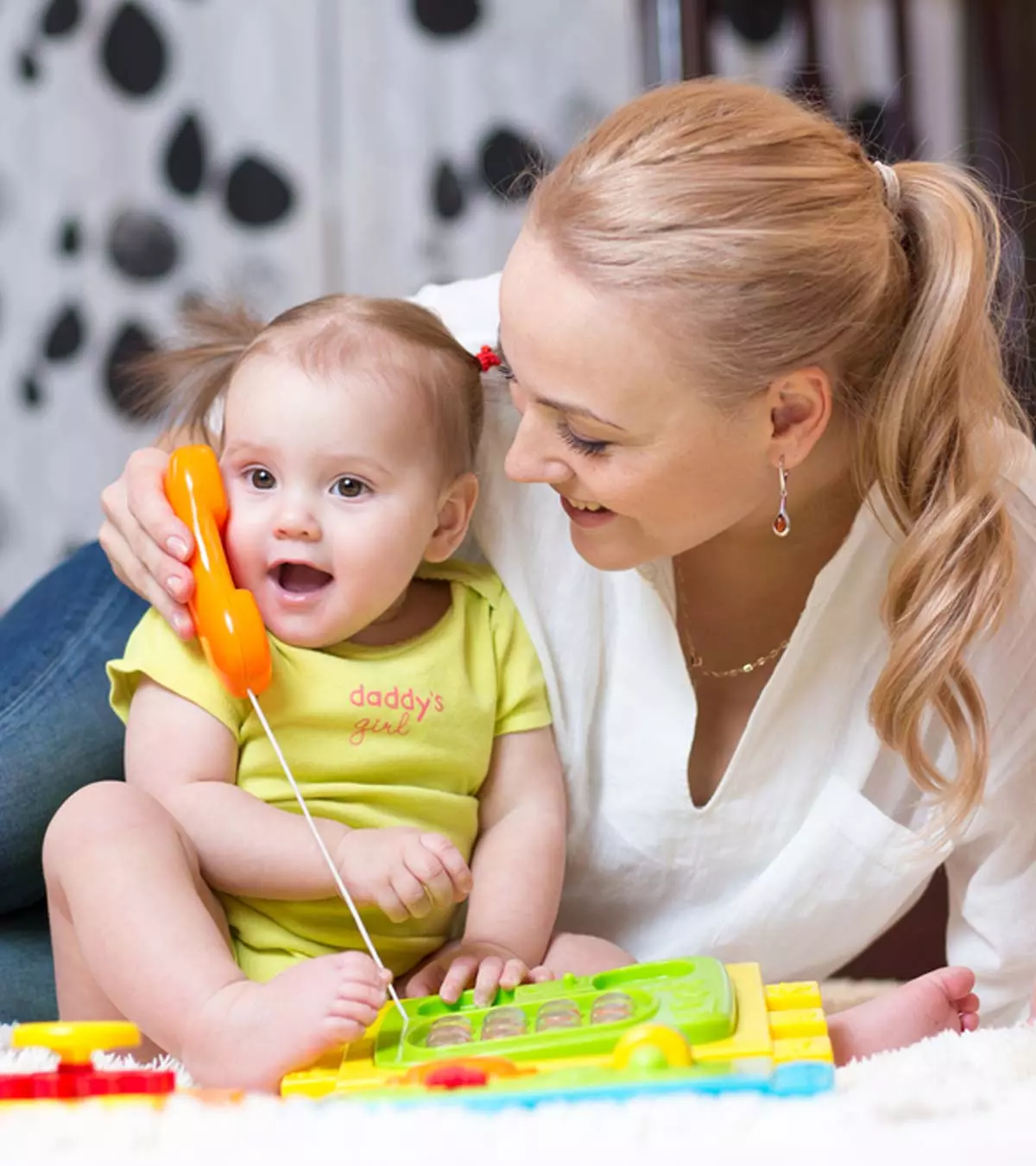
Image: Shutterstock
Positive self-talk for kids does not imply teaching them to suppress their negative emotions and always think positively but encouraging them to believe they can overcome difficulties. Alternatively, constantly suppressing negative emotions is called toxic positivity, which is harmful in the long run (1).

Self-talk refers to talking to oneself. All individuals engage in self-talk knowingly or unknowingly, and it can be encouraged in your child to boost their self-esteem and confidence (2).
Positive self-talk ensures your child is happier, more confident, and has improved mental and physical health. Children feel uplifted as it encourages them to face all situations optimistically. It opens their minds, helps them achieve difficult targets, and also ensures a lighter atmosphere in your home.
Read this post to learn more about the importance of positive self-talk for children and how to encourage them to inculcate this habit.
Key Pointers
- A positive self-talk boosts a child’s confidence and motivates them to handle challenging situations in life.
- To encourage self-talk in children, explain to them the influence it could have on their thoughts.
- Help them analyze their thoughts and teach how to convert negative thoughts to positive ones.
- Gift them a few books on positive self-talk or a handout on positive affirmations.
Importance Of Positive Self-Talk For Kids

Negative thoughts can invisibly demotivate and sap your child’s confidence. Children, especially pre-teens and teenagers, are prone to self-doubt. They could have a lot of negative thoughts wearing them down and chipping their self-esteem.
Self-talk affects our psyche more profoundly than we realize. Here are some benefits of positive self-talk for kids (2) (3).
- They can acquire self-confidence.
- They develop a positive attitude towards life.
- They learn to handle difficult situations.
- They realize your worth as a parent.
- They are ready to initiate dialogue when they face hurdles.
Ways To Encourage Positive Self-Talk In Children
If your child is pessimistic, don’t worry. There are ways you can encourage them to think positively and thus, improve positive self-talk.
1. Create awareness
The first step to helping your child start positive self-talk is to make them aware of it. Even as adults, many of us are unaware of self-talk and its influence on our daily lives. So, it might seem quite an alien concept to your child (3).
Explain what self-talk is and how it can influence their thinking. Next, ask them to recognize the areas they feel weak and the ones they are strong at. Ask them how they manage their feelings related to a specific task. Is there a way they can do it better or make it easier? These questions will make them aware of their inner feelings. You could even ask them to note their feelings in a diary or a chart so that they can notice the changes later on.
2. Analyze thoughts

Once your child understands what self-talk is, start working on it consciously. Let them keep a paper and pen with them. Make them write down at least five inner thoughts a day. Once they start doing that, you can help them analyze their feelings (2).
Analyzing the thoughts helps in identifying recurring patterns. Though children have random thoughts throughout the day, there will be times when they repeatedly have the same thoughts. It could be a sick feeling before leaving for school or an exhilaration after a PE session. Over time, you will be able to see these patterns.
 Research says
Research says3. Spot negative self-talk
From the unending stream of self-talk, your child should learn to spot negative self-talk (2). The step is important as it encourages your child to think positively and develop self-love. However, it might also be difficult as it requires a lot of concentration and identifying those negative thoughts that might pass off as positive.
Not every negative thought has a negative word in it. While “I can’t finish this math homework” is a direct negative thought, “That other person is cleverer than me. Even if I study all night, he will pass,” is also a negative statement. Recognizing them is one of the basic steps to overcome them.
4. Name the negative voice
CounterintuitiveiSomething that is not in line with what one would expect or anticipate based on prior knowledge or experience. as it sounds, naming their inner negative voice helps children overcome their negative thoughts. Giving it a funny name could be loads of fun for your child. They will also start thinking of their negative emotions as something separate from themselves.
Names such as ‘Pessimistic Polly’ or ‘Angry Andy’ might sound crazy to you, but it could help children. It will help in making a move from a negative or pessimistic mindset to a positive one, and gain control over feelings and emotions. It might also encourage self-compassion.
5. Convert negative self-talk into positive
Help your children rephrase their negative emotions into positive alternatives. They can do it in the form of dialogues or telling themselves, they can do it (5).
However, the technique needs practice. As with any other method, your child has to consciously watch out for negative thoughts and replace them with positive ones. With time, your child will be able to do it easily. This will help them develop self-worth.
Ask your older child to be as kind to themselves as they are to others. For example, she might never call her friend fat or ugly but might think these words for herself.
6. Use positive affirmations
Positive affirmations and self-encouragement may seem cheesy to you. However, you can encourage your child to use these positive affirmations to transform their lives (4).
For example, if they feel they cannot solve math problems, let them use a positive affirmation saying, “I might not know this, but I can surely solve it with my parents’ or teacher’s help!” Such positive affirmations help build positive behavior in children while reinforcing self-belief and your child’s confidence in themselves. You can get positive affirmations off the internet or even make some yourselves according to the situation.
7. Adapt to the real world
Now that your children are familiar with recognizing negative thoughts and replacing them with positive self-talk, teach them techniques they can apply in the real world.
When they encounter a problem, ask them what they would like to do next to overcome their issue. If they seem unsure, help them with suggestions. Techniques, such as counting to ten, taking deep breaths, talking to a friend, or asking for help, can make them overcome their problems (6).
8. Read books of positive self-talk

Books are a never-ending source of information. If done right, they can be the source of inspiration for children. Depending on your child’s age, decide which books they can read to boost their morale (3).
Picture books and story books can teach positivity and help children shift their mindset to a positive one. Even popular books such as Harry Potter promote the value of positive thinking and friendship.
9. Model positive self-talk
Our children learn more from us than we could imagine. Rather than asking them to do something, modeling their behavior is a more effective technique to follow good habits (5).
In other words, if you want your child to cultivate the habit of positive self-talk, you need to behave the same way as well. You should start using positive language. Stop saying negative things about yourself and start practicing to talk positively. If they find you saying, “let me do this differently” or “I think I should not go for it,” would not only help your child develop positive self-talk but will also boost your morale.
10. Include self-talk in everyday conversation
Having regular discussions about positive thoughts can help your child remember what self-talk is and how it affects them. Ask them about their feelings and convert negative thoughts into positive ones. Positive reinforcement can help them view themselves in a positive way.
In turn, you can also discuss your negative thoughts and how you overcome them. An open discussion will help your child relax in your company and talk about their feelings more freely.
11. Offer compliments

Praising children encourages them to do better (5). It is up to you to appreciate them only as much as they deserve. Use positive words to give feedback. It gives your child a realistic outlook, and they also learn to value your words. If they stumble somewhere along the way, make it a point to praise their strength instead of saying they shouldn’t at all.
12. Use mindfulness
Mindfulness techniques such as yoga and meditation can help your child be more aware and control their thoughts. When done right, these techniques can bring peace to your young ones’ minds and let them focus on the present (4).
Using mindfulness is a good way to relax their minds and identify different thoughts. It will also teach your child to express their feelings instead of repressing them. The technique helps them view their emotions as a separate entity and thus develop positive self-talk.
13. Teach time management
Teaching time management involves a combination of practical strategies and helps children develop a positive mindset. Start by helping children set achievable and realistic goals and teach them to allocate time wisely, depending on the importance and urgency of each task. Guide them to tackle the most challenging or important tasks first when their energy and focus are at their peak. Introduce the concept of time through timers or alarms, which helps children understand the importance of time and estimate how long tasks take. You can also encourage them to set timers for short breaks during study sessions.
You do not need to be a registered counselor to make your child practice positive self-talk. It is easy but requires some patience and perseverance on your part. With regular practice, you can instill the idea of positive self-talk in your child’s mind. Once that is done, all you need to do is talk about it regularly and nudge them gently in the direction when they seem to drift.
With time and practice, positive self-talk will become a regular habit, and you will start noticing positive changes in yourself and your children.
How Often Should Kids Use Positive Affirmations?
You may encourage your kids to repeat affirmations three to four times, progressively louder and with more confidence each time for more effectiveness. You can teach them to repeat and use positive phrases in their daily routines. It will take a few minutes but can serve as a quick brain break, helping them to refocus during lengthy tasks.
Try to work on one affirmation daily or weekly with your child to help them gain confidence, and encourage them through positive reinforcement for kids. This practice cultivates a strong sense of self-worth, helping them get away from negativity (8).
Frequently Asked Questions
1. How can positive self-talk help with goal setting in kids?
Using positive affirmations for kids helps improve children’s self-esteem, motivates and inspires them, and improves their mental and physical well-being. Educators, parents, and counselors should encourage children to learn and practice positive self-talk early to have less stress and positive life outcomes.
2. What are the benefits of positive self-talk in sport?
Positive self-talk in sports can boost an athlete’s confidence and motivate them to achieve certain goals. It also helps to divert the attention to the focus and improve the performance or quality of the movement. Self-talk training also helps athletes cope with anxiety and develops their self-efficacyiAn individual's belief in their ability to successfully perform a task or accomplish a goal. and volitionaliBehavior that is under an individual's control or influenced by their own choices. skills (8).
The bitter truth is that sometimes life is complex. At such moments, self-talk soothes, rejuvenates, and prepares us to give our best. Hence, use positive words of encouragement for kids as often as you can and encourage them to do the same. Teaching positive self-talk to kids is challenging, especially if your child is a pessimist. But take the initiative and be consistent. Tell them about the wonders being optimistic can do and nudge them towards thinking positively frequently. Once your child starts seeing the benefits of positive self-talk, they will start using it in their life.
Infographic: Phrases To Induce Positivity In Children
Children need your support and guidance to stay confident, focused, and happy. So along with the above self-talk tips, try some positive phrases that you as parents can occasionally tell your children to boost their confidence and keep them happy and uplifted. Give this infographic a good read and save it for your reference whenever your children need some reassurance from you.
Some thing wrong with infographic shortcode. please verify shortcode syntax
Illustration: Positive Self-Talk For Kids: Importance & 12 Ways To Teach It

Image: Stable Diffusion/MomJunction Design Team
References
- What You Need to Know About Toxic Positivity.
https://rightasrain.uwmedicine.org/mind/well-being/toxic-positivity - Teaching Children to Use Positive Self-Talk to Build Self-Confidence.
https://kidsintransitiontoschool.org/teaching-children-to-use-positive-self-talk-to-build-self-confidence/ - Positive Thinking.
https://www.livermoreschools.org/students-families/mental-health/protective-factors/positive-thinking - Self-Care: Self-Talk for Elementary School.
https://www.morningsidecenter.org/teachable-moment/lessons/self-care-self-talk-elementary-school - 15 Ways to Practice Positive Self-Talk for Success.
https://www.lifehack.org/504756/self-talk-determines-your-success-15-tips - 7 Tips To Stay Positive In Negative Situations.
https://www.lifehack.org/articles/communication/5-tips-stay-positive-negative-situations.html - How to Use Positive Affirmations for Kids for Better Wellbeing.
https://ripplekindness.org/why-affirmations-are-important-for-children/ - Nadja Walter et al.; 2019; Effects of Self-Talk Training on Competitive Anxiety Self-Efficacy Volitional Skills and Performance: An Intervention Study with Junior Sub-Elite Athletes.
https://www.ncbi.nlm.nih.gov/pmc/articles/PMC6628429/ - Kim J et al., 2025; The effects of positive or negative self-talk on the alteration of brain functional connectivity by performing cognitive tasks.
https://www.ncbi.nlm.nih.gov/pmc/articles/PMC6628429/
Community Experiences
Join the conversation and become a part of our nurturing community! Share your stories, experiences, and insights to connect with fellow parents.
Read full bio of Dr. Neha Bhave Salankar
Read full bio of Apoorva K
Read full bio of Harshita Makvana
Read full bio of Shinta Liz Sunny
















